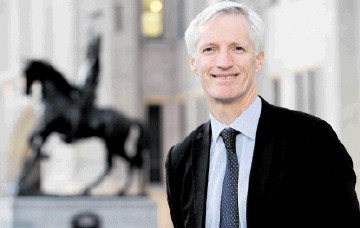
t is now more than eight years since Iain Todd was asked to help Aberdeen become the UK’s green-energy capital.
He left the Department of Trade and Industry (DTI) in June 2004 to take on the role of renewable-energy “champion” with Aberdeen Renewable Energy Group (Areg), which had been formed three years earlier.
Mr Todd, now 58, has since worked with a range of organisations around the north-east to promote the growth of renewable-energy projects and raise their profile nationally and internationally.
He played a key role in helping Aberdeen City Council to bring hydrogen buses to the Granite City and, as Grampian Biomass Working Group chairman, has also been instrumental in the development of biomass-based heating.
Another of his duties is to act as spokesman for the European Offshore Wind Deployment Centre (EOWDC), the windfarm and turbine demonstration site controversially planned for Aberdeen Bay.
The honorary professor of renewable-energy policy at both Aberdeen and Robert Gordon universities also works as a consultant to the Scottish Government and helped set up the Aberdeen-based Scottish European Green Energy Centre (Segec).
Mr Todd, who grew up at Cupar Angus, is in Glasgow for the 34th annual conference of industry body RenewableUK. Looking forward to rubbing shoulders with other leading figures in the sector, he said: “One of the key issues will be the need to reduce the cost of offshore wind.”
The UK Government has set a target of cutting the cost from more than £140 per megawatt hour (MWh) to £100/MWh by 2020.
According to Mr Todd, the north-east’s oil and gas expertise and the EOWDC- being developed through a joint venture involving Areg, utility Vattenfall and energy service firm Technip – can help to make this happen.
The £150million EOWDC project has upset US billionaire Donald Trump, who does not want the proposed 11-turbine offshore windfarm to spoil views from his new golf course near Balmedie.
Mr Todd said opponents of turbines had often exaggerated their case, adding: “No one is talking about carpeting Scotland with windfarms. I think most people would support the sustainable development of energy in a way that does not create obligations for our future generations.”
Mr Todd, who lives at Lundin Links in Fife, got married this summer. He and new wife Carol honeymooned in Australia, where his son, William, lives, and Singapore.
The couple’s home is not short on signs of a strong environment-conscious streak in the make-up of its occupants. Solar panels on the roof and an electric car in the drive are a clear sign that Mr and Mrs Todd, an optician, are personally committed to the cause.
Mr Todd, who has three grown-up children – William, Liz and Fiona – spends much of his spare time playing the bagpipes.
He is part of Stockbridge Pipe Band in Edinburgh and regularly competes in piping competitions. As well as piping at the annual All-Energy conference in Aberdeen for five years, he has entertained guests at the Scottish Green Energy Awards in Edinburgh. His most memorable piping experience came during a visit to the Far East for a renewables conference, when he played to bemused tourists on the Great Wall of China.
The keen mountaineer is a member of the Mountaineering Council of Scotland. Having scaled Lochnagar aged 12 and taken each of his children on the same climb when they turned 12, he plans the same rite of passage for his three-year-old granddaughter.
The former Blairgowrie High School pupil said: “Although I didn’t choose the Areg job title of renewables champion, championing this sector is exactly what I do. Aberdeen city and shire are already carving out a leading position within the industry by successfully applying their long-established oil and gas expertise into renewables.
“Aberdeen is not only looking to offshore wind for its energy future. It has developed plans and assembled financing to build some of Europe’s most advanced and extensive infrastructure based on renewable hydrogen.
“This will keep our city at the forefront of energy thinking for decades to come.”
Mr Todd said his career to date had an unintentional energy thread running through it.
After graduating with an engineering degree from Oxford, he started working in dams and hydro-power.
He then worked as an engineering inspector for the Health and Safety Executive (HSE), including a spell in the nuclear industry.
The 1988 Piper Alpha disaster in the North Sea led to the creation of a new HSE offshore safety division, to which Mr Todd was assigned and in 2000 he became director of oil and gas development at the DTI.
In 2002, he was appointed the DTI’s director of renewable energy.
Recommended for you
